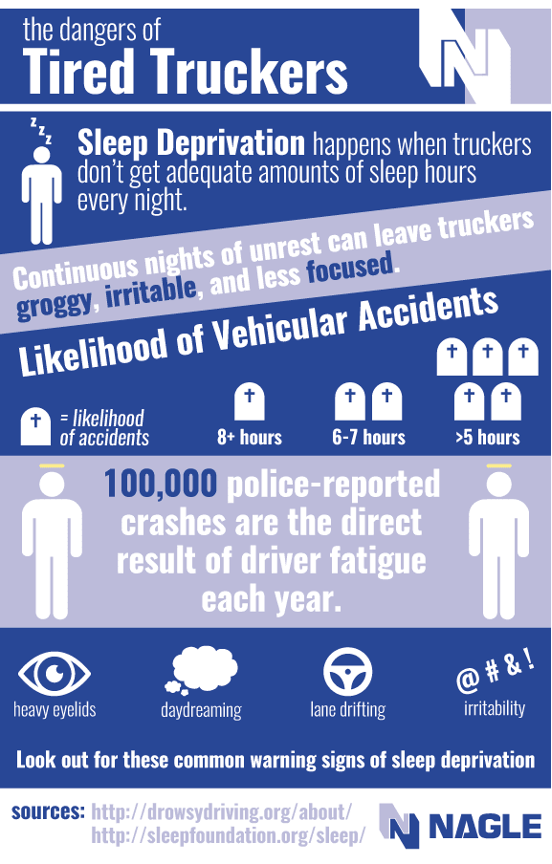There’s nothing worse than being so tired that your eyelids feel like they’re being weighed down and you catch your head bobbing as you drift in and out of consciousness. Times where it’s normal for you to experience drowsy driving might be right after welcoming a newborn baby or the morning after a late night out with friends.
The National Highway Traffic Safety Administration (NHTSA) suggests that a loss of sleep may contribute to 30-40% of all crashes on the highways. And ong-haul trips, which usually mean the driver must be awake for longer periods, account for 65% of all fatal truck crashes. Regardless of what causes your fatigue, it’s important, especially for truck drivers, to recognize the dangers that come with drowsy driving to keep yourself, and other drivers on the road, safe.
What makes driving drowsy so dangerous?
Not getting enough sleeps affects your ability to both mentally and physically perform the way you need to in order to safely drive your truck. The Centers for Disease Control and Prevention (CDC) reports that not only does it increase your chances of falling asleep or nodding off while driving, but it can also:
- Cause slower reaction times.
- Lead to poor decision-making.
- Increase forgetfulness, such as how many miles you’ve traveled.
- Make you experience tunnel-vision.
- Cause drifting into other lanes.
If a truck driver is fatigued, it can have even more devastating impacts due to the size and weight of the vehicle.
Are there any medical conditions that make a truck driver more prone to feeling drowsy while out on the road?
Conditions like insomnia or sleep apnea can put you at a higher risk of driving while drowsy. In fact studies have shown people with sleep apnea are up to five times more likely to get into a car accident than people who have more consistent, normal sleep patterns.
The same goes for truckers who struggle with insomnia. In fact, approximately 27% of all truck drivers struggle with insomnia, that means at least a quarter of truckers have to be conscious about fighting fatigue while on the road.
How can truck drivers prevent fatigue and stay alert while driving?
There are a few ways to help prevent fatigue while on the road, almost all of them are centered around getting a good night’s sleep and keeping your body fueled:
- Eat a healthy, well-balanced diet. Specifically stay away from heavily caffeinated drinks or sugary sweets, both can keep you up at night.
- Drink water more than anything else. Not only can hydration improve your sleep at night, it can also help you stay more alert. People who are mildly dehydrated experience strong feelings of fatigue more frequently.
- If you’ve been driving for a while and feel bored/tired take a longer break than normal.
- If you can, avoid driving during times where the body becomes naturally drowsier (between 12 am and 6am). About 50% of accidents involving driver fatigue take place between midnight and 8 am.
- Turn your phone on do not disturb and limit your screen time at least an hour before bed.
- Find a relaxing bedtime routine for yourself, like reading for 30 minutes while sipping on your favorite (non-caffeinated) warm beverage.
- Use different tools and equipment to maximize your sleep, whether it’s a CPAP machine for sleep apnea or just a simple sound machine to help lull you to sleep. They even make apps to help you get a better night’s rest now!
Anyone can get sleepy behind the wheel, but certain groups are at a significantly higher risk of drowsy driving than others, one of those groups being long-haul and commercial truck drivers. Drowsy driving is a critical safety issue, so it’s incredibly important to keep these tips in mind to help yourself, and others, stay safe on the road.






